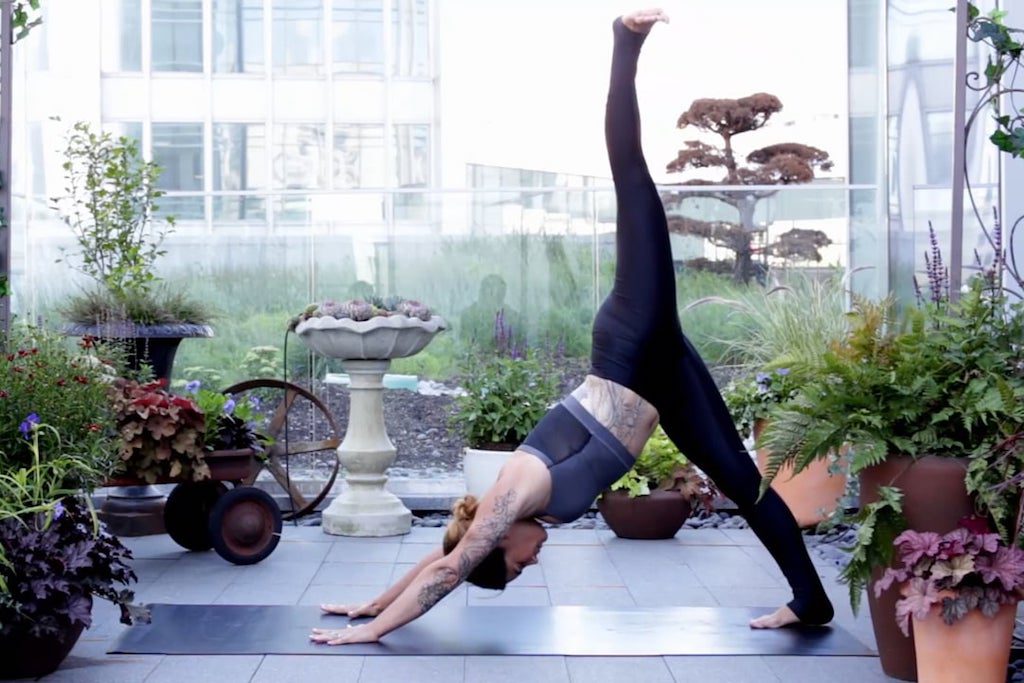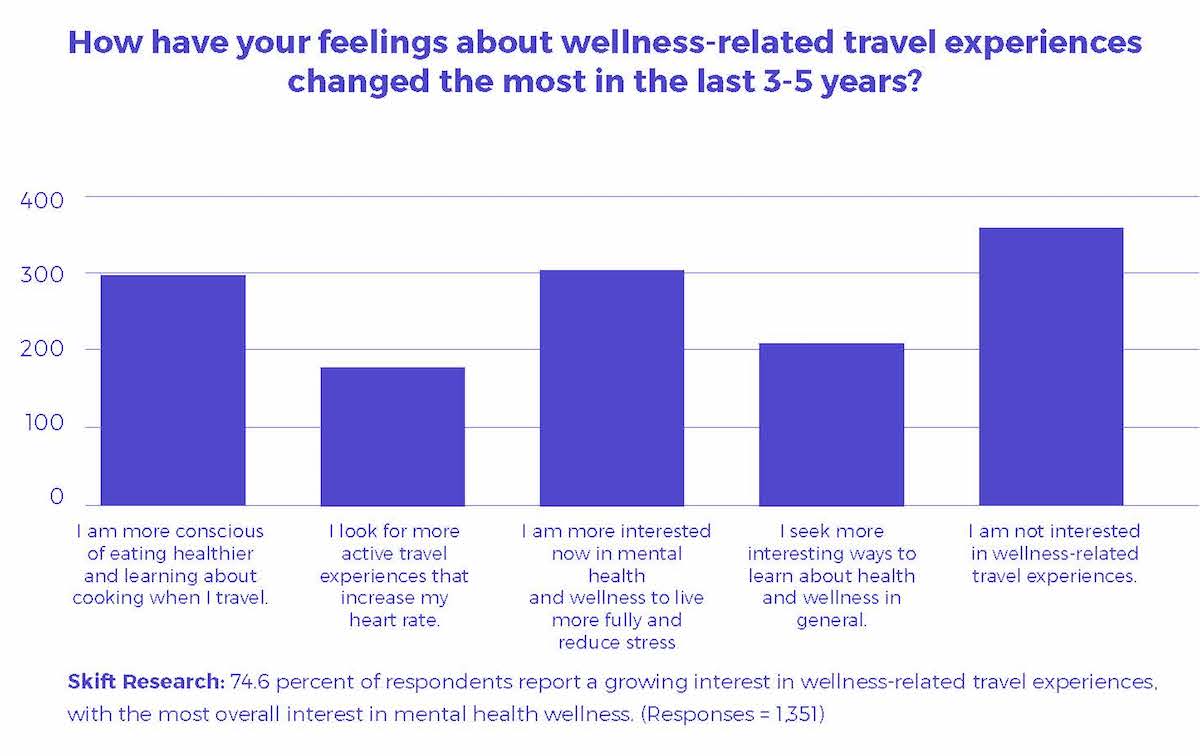Skift Take
Hotel brands are developing more all-encompassing wellness retreats and partnering with trendy health brands in an attempt to deliver transformative travel experiences.
Wellness is now mainstream in luxury hospitality, and it’s becoming more prevalent in the upper-upscale category as well.
For example, Hilton just unveiled a new in-room gym design, and Westin debuted its new partnership with boutique cycling company Peloton.
Not that people always actually work out during their hotel stay, of course. A recent Cornell University Center for Hospitality Research study showed that 46 percent of guests intend to use hotel fitness amenities, but only 22 percent actually do.
Therefore, the challenge for hotels is finding creative ways to motivate guests to do what they say they aspire to do, in an effort to provide a transformative travel experience that extends beyond the hotel stay.
Surprisingly, the rise of “FitTech” was supposed to revolutionize the hotel health and fitness experience. That’s not happening either, at least not at any kind of scale. One reason is because clinical studies are showing that the health benefits for using fitness wearables are underwhelming, and even anti-productive at times.
In a two-year University of Pittsburgh research trial, “Effect of Wearable Technology Combined With a Lifestyle Intervention on Long-term Weight Loss,” test subjects were separated into two exercise groups. Both groups were provided with traditional weight management strategies, and one of them was provided with fitness wearables.
The report’s conclusion reads: “Among young adults with a BMI (body mass index) between 25 and less than 40, the addition of a wearable technology device to a standard behavioral intervention resulted in less weight loss over 24 months. Devices that monitor and provide feedback on physical activity may not offer an advantage over standard behavioral weight loss approaches.”
What does seem to be gaining traction, hotels are teaming up with well-known third parties in the wellness industry to attract health-conscious clientele.
Jack Ezon, president of Ovation Vacations in New York, stated in his annual luxury travel trend report: “Hotels seeking to differentiate themselves in the burgeoning wellness space are signing lucrative partnerships with leading wellness partners.”
Some examples are:
- Lululemon and Shangri-La Hotel, Toronto collaborated on the development of an original yoga video with Lululemon ambassador Amber Joliat. Guests can access the video on the Shangri-La’s guest room TV’s and iPads while practicing yoga in the privacy of their rooms on Lululemon yoga mats.
- Mandarin Oriental Hotels and The Mayo Clinic launched a series of Healthy Living Programs at properties including Mandarin Oriental, Washington DC and Mandarin Oriental, Bodrum in Turkey. The programs marry Mandarin Oriental’s spa facilities with The Mayo Clinic’s restorative therapies, with packages ranging from 1-5 days.
- Park Hyatt New York partnered with the popular MNDFL meditation studio to develop a series of private and semi-private guided meditation sessions, hosted in dedicated meditation spaces within Spa Nalai. More recently, Park Hyatt Hotels partnered with Dr. Frank Lipman to incorporate his Be Well brand into its programming and products.
Rising Demand For Mental Wellness Programs
The Global Wellness Summit 2017 trend report proposed eight shifts in the wellness marketplace. The most significant evolution in wellness seems to be the rise of interest in improving mental health in addition to body-centric approaches.
The report reads: “Mental wellness will be the biggest future trend, period, from wellness destinations and spas bringing in neuroscientists and psychotherapists to meditation becoming seriously mainstream.”
According to Skift research prepared for the International Luxury Travel Market 2017 report, three out of four survey respondents stated a growing interest in wellness-related travel experiences, with mental health ranking as the highest priority among them.
“While massages and body treatments do wonders for the body, they do very little for long-term spiritual well-being,” says Undraa Buyannemekh, president of Nomadic Expeditions and Three Camel Lodge in Mongolia. “So Three Camel Lodge is offering guided meditation sessions.”
In Miami, Acqualina Hotel & Spa recently launched a monthly Health and Wellness Series with events like “Mark Oliver’s Simple Techniques to Quiet the Mind.”
The session is promoted as: “When the mind stops spinning we find ourselves in the present moment. We long for moments of calm serenity. Bliss and happiness seem elusive, but there are some very simple actions we can perform to calm the mind.”
Seeing the growing demand for more advanced mental wellness and life coaching, hotels are rolling out more multi-day packages incorporating traditional spa experiences and mental health improvement sessions.
According to Ezon, this is opening up a new travel niche he calls “Fitcations.”
“Fitcations are vacations people take to get themselves in shape, often with friends, and they are one of our fastest growing initiatives,” he explains. “People are starting to make decisions on where to stay based on their food and fitness options. The emergence of Fitcations are a phenomenon that grew about 15 percent in the past two years. We have done full buy-outs of bootcamps like the Ranch at Live Oak [in Malibu, California], and in addition to these larger events, smaller Fitcations for groups of 6-10 people are becoming popular.”
Likewise, Canyon Ranch is expanding its week-long Life Enhancement Center programming, which delivers a series of coaching sessions targeting all aspects of a person’s health routine and wellness lifestyle. Each package is customized to the individual client who defines his or her goals beforehand with the Center’s instructors to ensure a degree of codified learning and progress.
According to Kathleen Shea, CMO of Canyon Ranch, the agenda incorporates fitness and movement classes, hands-on sessions, workshops, and group discussions with physicians, nutritionists, life management experts, and exercise physiologists.
“Canyon Ranch embraces an integrative approach to optimal wellness, including tapping into one’s emotional, mental, physical, and spiritual state,” she says. “The various disciplines help guests achieve their goals and create greater balance in their life. This approach goes beyond just relaxation, but allows our guests the opportunity for complete transformation, beginning at our resorts and extending beyond their stay.”
This is an excerpt from a Skift Trends Report, produced in partnership with International Luxury Travel Market (ILTM). The report explores the many disruptions in luxury travel where tired narratives about what upscale travelers want no longer suffice. The very definition of “luxury” is nebulous today, meaning different things to a widening arc of customers with myriad psychographic profiles, age brackets, and personal lifestyles, emerging from a continually expanding range of source markets.
Have a confidential tip for Skift? Get in touch
Photo credit: Lululemon and Shangri-La Hotel, Toronto co-created an original yoga video with Lululemon ambassador Amber Joliat. Shangri-La Hotels

